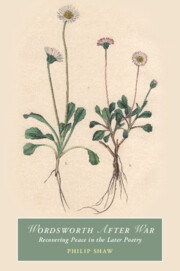Acknowledgements
I considered writing a book about Wordsworth’s later poetry many years ago, but these ideas only came into focus thanks to chance conversations with David L. Clark and Jacques Khalip at the ‘Late Romanticism: Past and Present’ conference at KU Leuven in December 2019. I am grateful to David and Jacques for their encouragement, to Brecht de Groote and Tom Toremans for the opportunity to speak at this conference, and to Tim Fulford and Matt Sangster for their good company. Although not apparent to me at the time, an invitation from Alex Houen and Jan-Melissa Schramm to speak at the ‘Sacrifice and Modern War Literature’ conference at Pembroke College, Cambridge, in January 2014 contributed significantly to the development of this book. A portion of the chapter that appeared in the volume arising from this conference, Sacrifice and Modern War Literature, ed. Alex Houen and Jan-Melissa Schramm (Oxford: Oxford University Press, 2018), is reproduced in Chapter 3, with the permission of Oxford University Press. In 2016, an invitation from Michael Demson and Regina Hewitt to contribute a chapter to their edited collection, Commemorating Peterloo: Violence, Resilience and Claim-Making during the Romantic Era (Edinburgh: Edinburgh University Press, 2019), sowed the seeds for my thinking about Wordsworth’s River Duddon sonnets in Chapter 5. I am grateful to Edinburgh University Press for permission to adapt some of the material from this chapter. Conversations in the summer of 2015 with Simon Bainbridge, Emma Butcher, Jeff Cox, and the late Richard Gravil, along with many other friends and scholars during numerous Battle of Waterloo bicentenary events, also helped to lay a foundation for this study. The late Marilyn Gaul, a friend of peace, provided support and encouragement at a crucial time. For good cheer and assistance of various kinds, I am especially grateful to the following: Tom Bristow, Julia S. Carlson, Jeff Cowton, Michael Davies, Chris Donaldson, MC Drak, Scott Freer, Tim Fulford (again), Holly Furneaux, Bruce Graver, Martin Halliwell, Ian Haywood, Felicity James, Simon Kövesi, Matthew McCormack, Peter Manning, Catherine Morley, Julian North, Mark Rawlinson, Nick Roe, Victoria Stewart, Joanna Wilson-Scott, and Claire Wood.
The research for this book was supported by an Arts and Humanities Research Council Leadership Fellow award (AH/S003711/1). I am grateful to colleagues in the University of Leicester Research and Enterprise Division for their assistance both prior to and throughout the period of the award, but I should like to thank, in particular, Alan Ashton-Smith. For help with tracking down manuscripts and securing permissions for images, I am grateful to Jeff Cowton (again) at Dove Cottage and to Erica Persak and Sarah Yukich at the Kerry Stokes Collection. I owe thanks to Bethany Thomas at Cambridge University Press for the invitation to contribute a proposal for the Cambridge Studies in Romanticism series and for her advice and support at every step of the way. I wish also to extend my gratitude to the two anonymous readers of my study for their generosity and expertise. I hope this final version meets with their approval.
During the writing of this book, my teacher, mentor, and colleague Vincent Newey passed away. Wordsworth After War is dedicated to his memory and to the memory of my dad, Keith Shaw, who told me stories, taught me to write, and gave me books. As ever, I could not end these notes of gratitude without paying tribute to my wife, Sarah Knight: ‘In ours, the Vale of Friendship’. The Knight and Shaw families, ex toto, are my rock.
***
I began Wordsworth After War in the winter of 2019–2020. Work on the book continued during the COVID-19 pandemic and was brought to completion when Russia invaded Ukraine in February 2022. Months later, like most people, I struggle to comprehend these events and wonder just what can be said, with any exactitude, about their long-term effects. This feeling of bewilderment is perhaps a reminder that there is no such thing as a time ‘after war’, or if there is, then it is not for us. I hope, nevertheless, that readers will find some comfort in this book, which attempts haltingly and against the odds to make time for peace.

